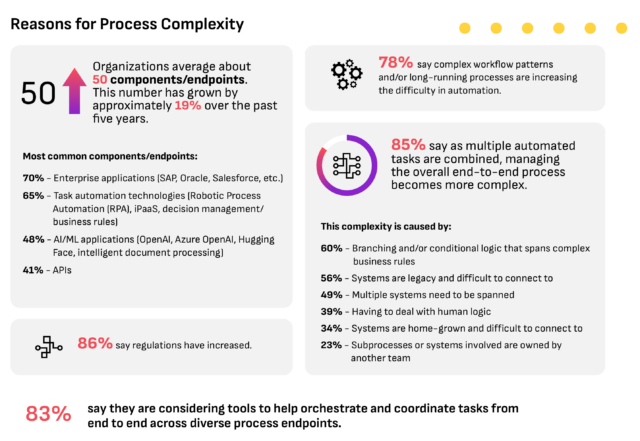Increasing business process complexity could lead to chaos

A new report shows 82 percent of organizations fear 'digital chaos' due to increasingly complex, interconnected, and automated processes. According to the report, a lack of control has increased compliance risks for 82 percent of organizations, while 77 percent report higher risks of core business processes failing.
The study from Camunda highlights that organizations now manage an average of 50 endpoints to execute tasks that are part of a process in their business. This is an increase of 19 percent over the past five years, and is contributing to growing business risk.
"End-to-end process orchestration and automation are critical to delivering business outcomes. However, today's digital infrastructures and processes are both complex and interdependent, making it a significant challenge," says Kurt Petersen, senior vice president, customer success, at Camunda. "In a constantly evolving landscape, organizations often struggle with siloed tools and technologies, which hinder their ability to streamline operations or achieve full visibility. Without decisive action, automation programs risk overwhelming organizations with fragile solutions, lack of comprehensive governance, excessive total cost of ownership, and increasingly reduced agility to meet changing business needs. Ultimately, companies who can't get their automation under control will lose out to savvy competitors who have mastered process orchestration and automation."
See also:
Complexity leads to trade-off between risk and innovation
Cyberecurity budgets increase as complexity grows
While most organizations are eager to expand their AI capabilities in the next three years, the report shows they face significant challenges in effectively scaling and operationalizing it. 85 percent of organizations face challenges in scaling and operationalizing AI across their business. 84 percent say a lack of transparency in applying AI applications within business processes is causing regulatory compliance issues, while 93 percent believe AI must be fully integrated into orchestrated processes to maximize the return on investment and business value.
Many organizations have implemented significant automation but often face challenges in effectively managing it across diverse systems and processes. 82 percent of businesses recognize the need for better tools to manage how their processes intersect, and 79 percent report that, while they have implemented significant automation, they lack a way to control, manage, and sustain it effectively. 86 percent say a company cannot have hyperautomation without having process orchestration.
You can get the full report from the Camunda site and there's an infographic below.

Image credit: nomadsoul1/depositphotos.com
